[A few more posts about last weekend’s
H+ Summit at Harvard.]
Before I get to my final thoughts on the 2010 H+ Summit, I’d like to share some images from the conference, as well as a smattering of impressions I had on the large number of talks to which I wasn’t able to devote full posts:
• One presenter —
Alex Backer, I believe — suggested that living longer will force us to focus more on the future. But this seems contrary to the ethos of transhumanism, for much as it promises great might and riches in the future, the future matters only inasmuch as it holds the possibility for greater pleasures in the present. As
William Gibson recently wrote: “If you’re fifteen or so, today, I suspect that you inhabit a sort of endless digital Now, a state of atemporality enabled by our increasingly efficient communal prosthetic memory…. The Future, capital-F, be it crystalline city on the hill or radioactive post-nuclear wasteland, is gone. Ahead of us, there is merely…more stuff. Events.”
Yuval Levin’s distinction between the “anthropology of innovation” and the “anthropology of generations” is instructive here: the future Backer has in mind is not posterity, or the future for our children — two concepts that transhumanism pushes to the margins — but one that happens to
us. So, Backer is saying, we will finally have a reason to worry about the effect of our actions on the future, because we personally will be around to suffer the consequences. Self-interest tempering self-interest.
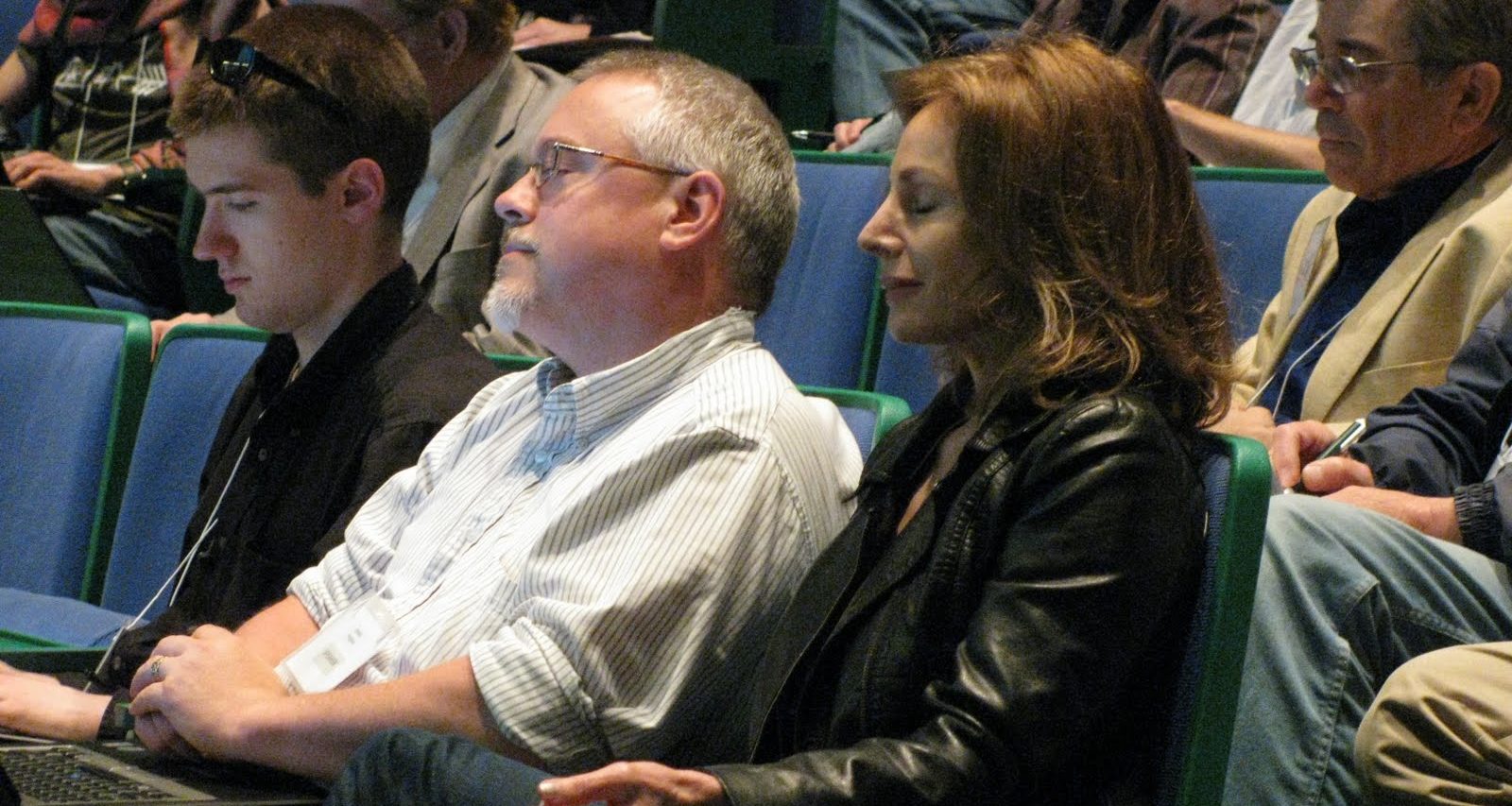 James Hughes and Natasha Vita-More focus on their breathing,at the request of presenter M. A. Greenstein.
James Hughes and Natasha Vita-More focus on their breathing,at the request of presenter M. A. Greenstein.• Andrea Kuszewski spoke about how to increase your cognitive capacity. Sometimes, she says, you need to use technology
less. For example, GPS makes it easier to get around but weakens your cognitive abilities relative to finding your way around by yourself. Technological enhancement versus the benefits of self-improvement and self-reliance: there’s a fraught pair of transhumanist imperatives if I’ve ever heard of one.
 The Harvard Mark I electro-mechanical computer, outside the conference hall.
The Harvard Mark I electro-mechanical computer, outside the conference hall.• Speaking of fraught transhumanist imperatives, Andrew Hessel’s talk reminds me that it’s really quite silly that transhumanists still adopt the pretense of being environmentalists. Modern-day environmentalism owes a huge debt to Romantic thinkers, who elevated sublime experiences of nature above the scientific hyper-rationalist view of nature prevalent in their day. Transhumanists, of course, can mount no such defense of nature. Their core views are either indifferent to nature in their focus on virtuality, or else revolted by nature in its original sins of death and suffering.
The best defense they can mount of nature consistent with their ideology is to talk vaguely about “preserving our biological heritage,” which calls to mind the Joni Mitchell lyrics: “They took all the trees and put them in a tree museum, then they charged the people a dollar and a half to see them.”
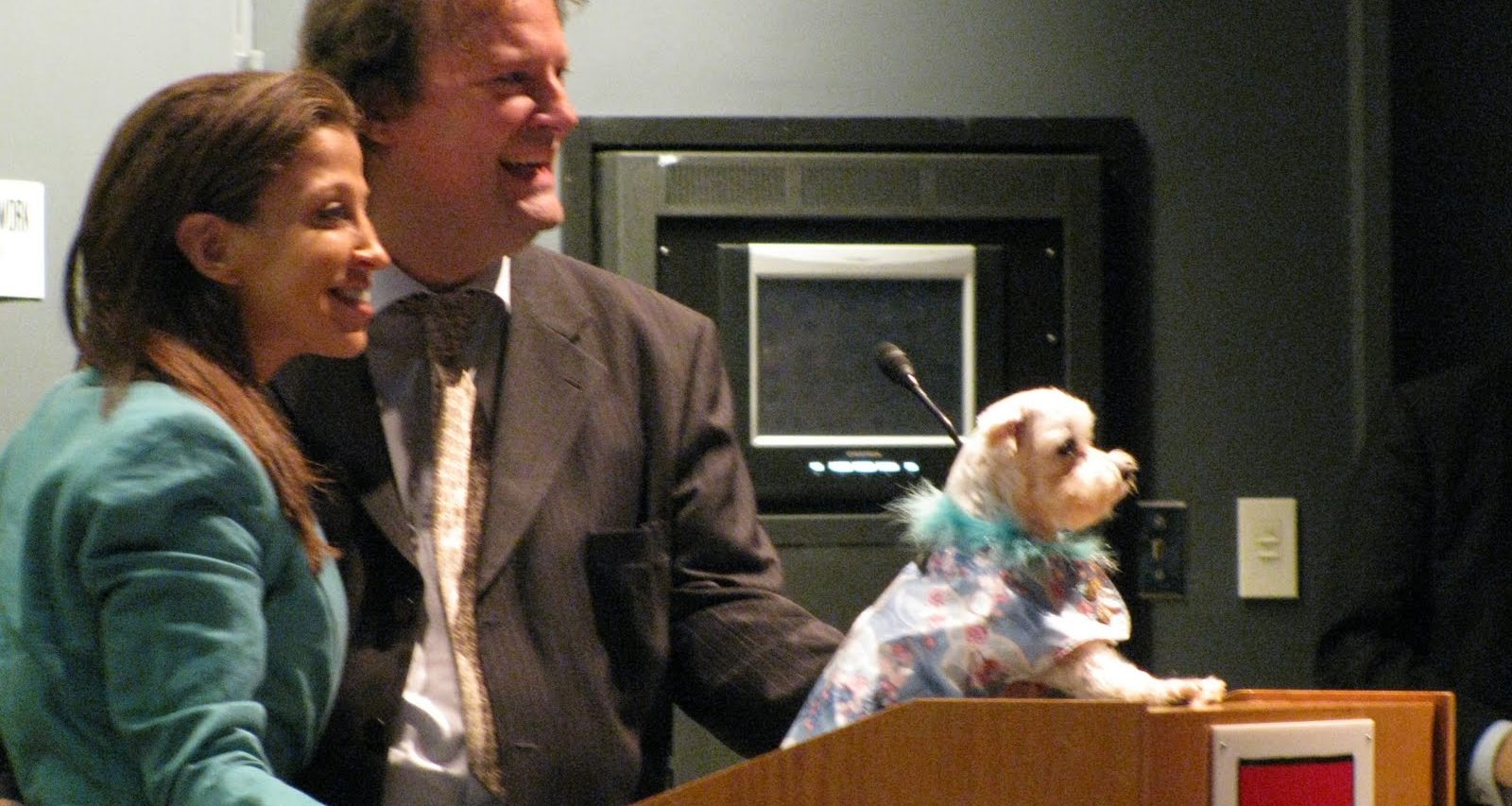 David Orban, a conferencegoer, and her little dog too.
David Orban, a conferencegoer, and her little dog too.
• Melanie Swan asked the audience how many of them have gotten genetic tests; to my eye, about a quarter of the conferencegoers raised their hands.
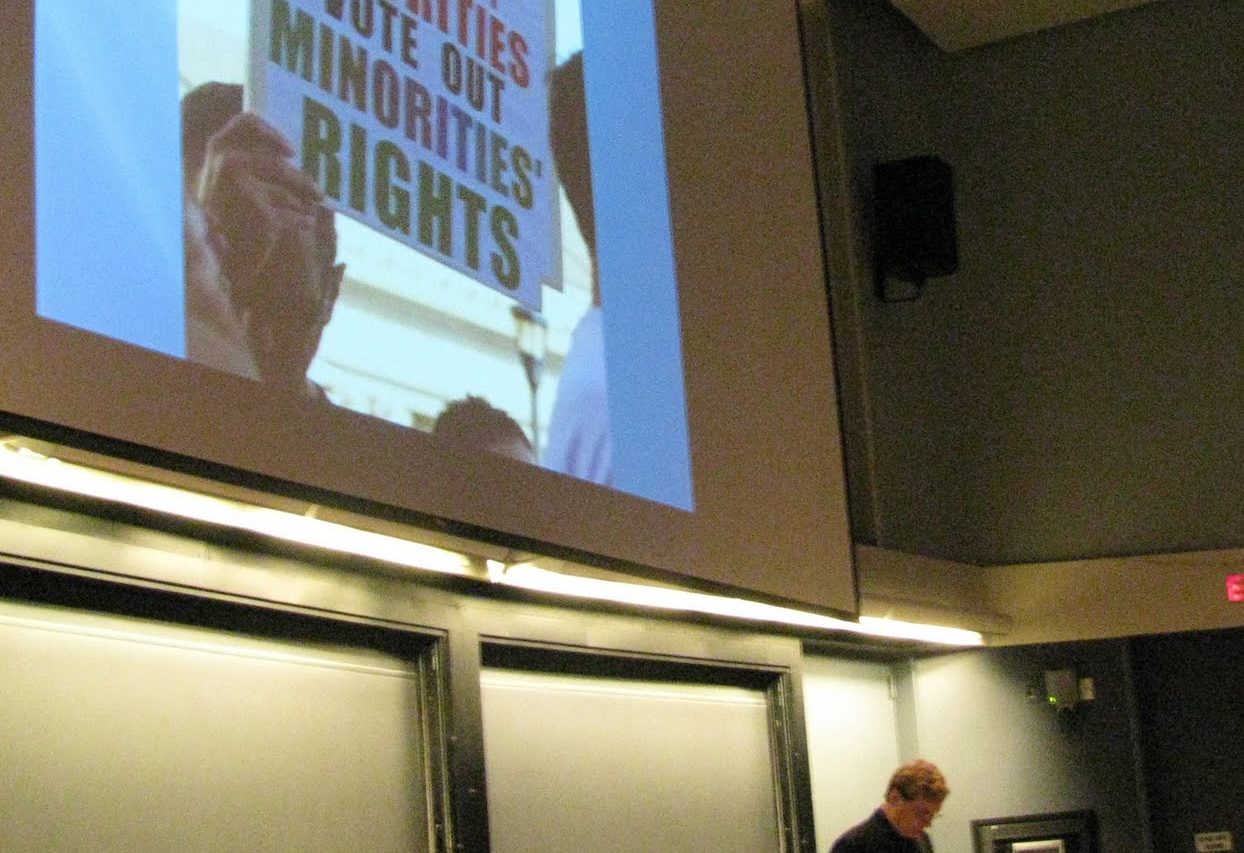 Ron Bailey
Ron Bailey• In his talk at the conference, Reason magazine science writer Ron Bailey used a common transhumanist trope, comparing the end of laws discriminating against racial minorities to the end of laws discriminating against another supposed minority — the enhanced. Bailey only does this implicitly, but it’s funny how often criticism of transhumanism gets explicitly compared to chauvinism for white males, since most transhumanists are, as most of the attendees at this conference were, males and predominantly white.
Aside from Bailey’s disdain for democracy, it’s worth pointing out that he also groups legal restrictions on embryonic stem cell research under the umbrella of “democratic tyranny,” yet evinces no concern for exercising tyranny over the rights of these beings.
• Bailey also noted that it’s hard for this movement to form political coalitions among minorities as previous civil rights movements have, because of the small problem that there aren’t any enhanced humans. Whoops. This trifling fact indicates much bigger problems for the ontological anarchy of transhumanism than Bailey lets on.
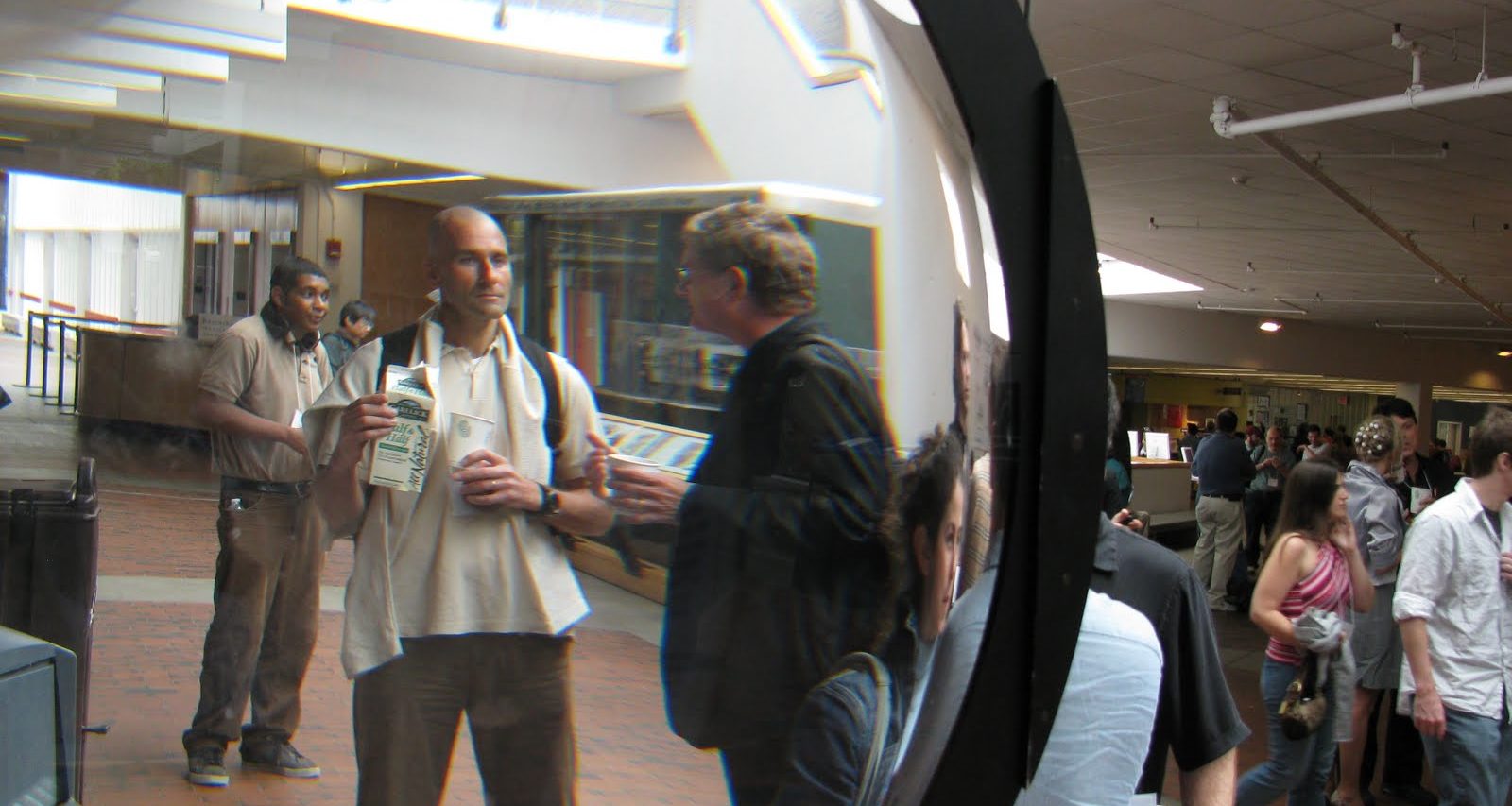 Ron Bailey and a conference attendee, through the looking-glass.
Ron Bailey and a conference attendee, through the looking-glass.• Speaking of the dominant male representation among transhumanists, it’s worth pointing out that there were many women speakers at this conference — far more than the lone one at the last Singularity Summit.
• One of the most hilariously earnest tweets of the conference came in response to Bailey’s talk. Twitterer anarchytweet (!)
wrote, “To Ronald Bailey: Do you think some form of anarchy could combat the tyranny of the majority without destroying civilization?” (This gets me to wondering if anyone has ever un-ironically tweeted “Anarchy in the UK!” from an AT&T iPhone.)

 Scenes from the after-party, in someone’s awesome converted-garage nerd-paradise workspace.
Scenes from the after-party, in someone’s awesome converted-garage nerd-paradise workspace.
• During a break, one of the organizers tested out the sound system by playing Fleetwood Mac’s “Rhiannon” off of his iPod. Great song. Do you think posthumans will ever still sit around listening to Fleetwood Mac? Is this an activity beneath beings who will spend their time having sex with 10,000 other consciousnesses at once? Or does this just mean they’ll have to switch to listening to
Darude and
John Digweed?

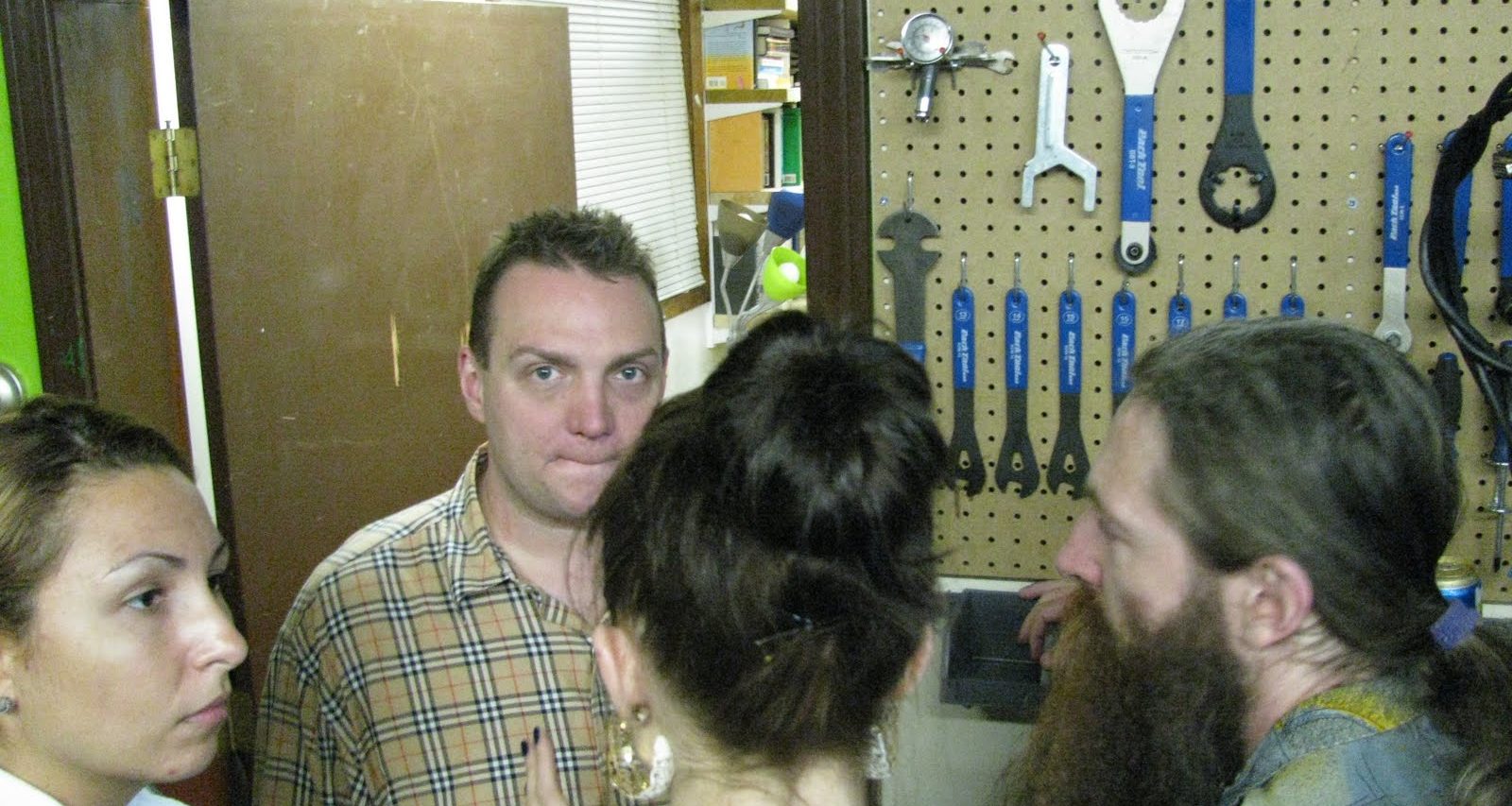 More scenes from the after-party. Aubrey de Grey at right.
More scenes from the after-party. Aubrey de Grey at right.• Millie Ray gave a brief overview of embryonic stem cells versus induced pluripotent stem (iPS) cells. She gave only the slightest mention in passing to the fact that “a lot of the ethical concerns” are bypassed via iPS cells — but, typical of the focus of this conference, didn’t mention at all what those concerns might be.
• The talks on the first day were plagued by various technical problems, particularly on Apple computers, that delayed the presentations. The organizers joke this off by noting that at least it’s not as bad as Steve Jobs’s recent embarrassment with Apple products not working at an Apple conference. Yeah, except Steve Jobs is only suggesting that we purchase his computers, not that we literally live in them.
• During one of the longer stretches where the audience was sitting and waiting for a technical issue to be resolved, a woman sitting near me turned to her friend and remarked, apparently unsarcastically, “I hate technology.”
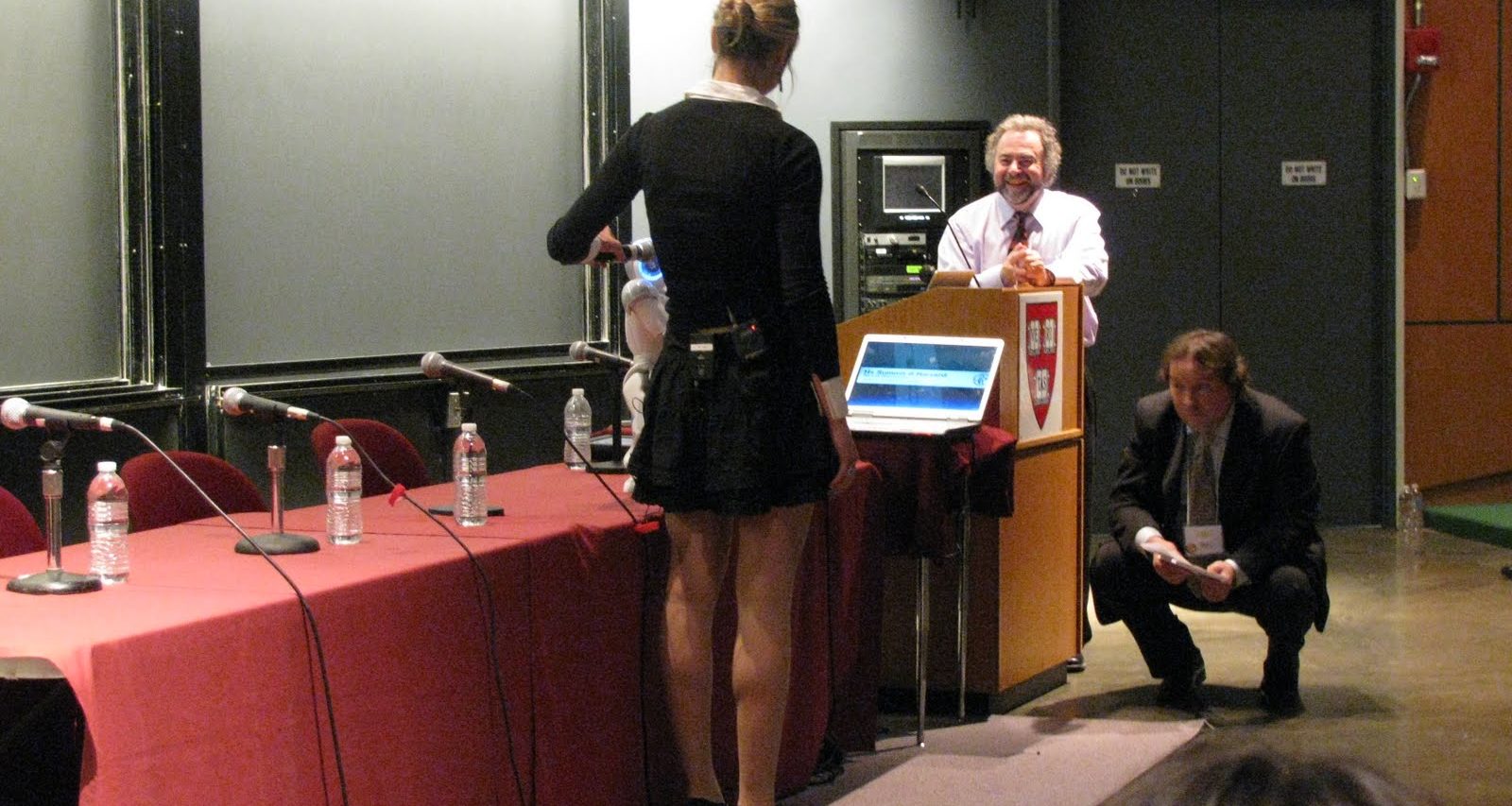
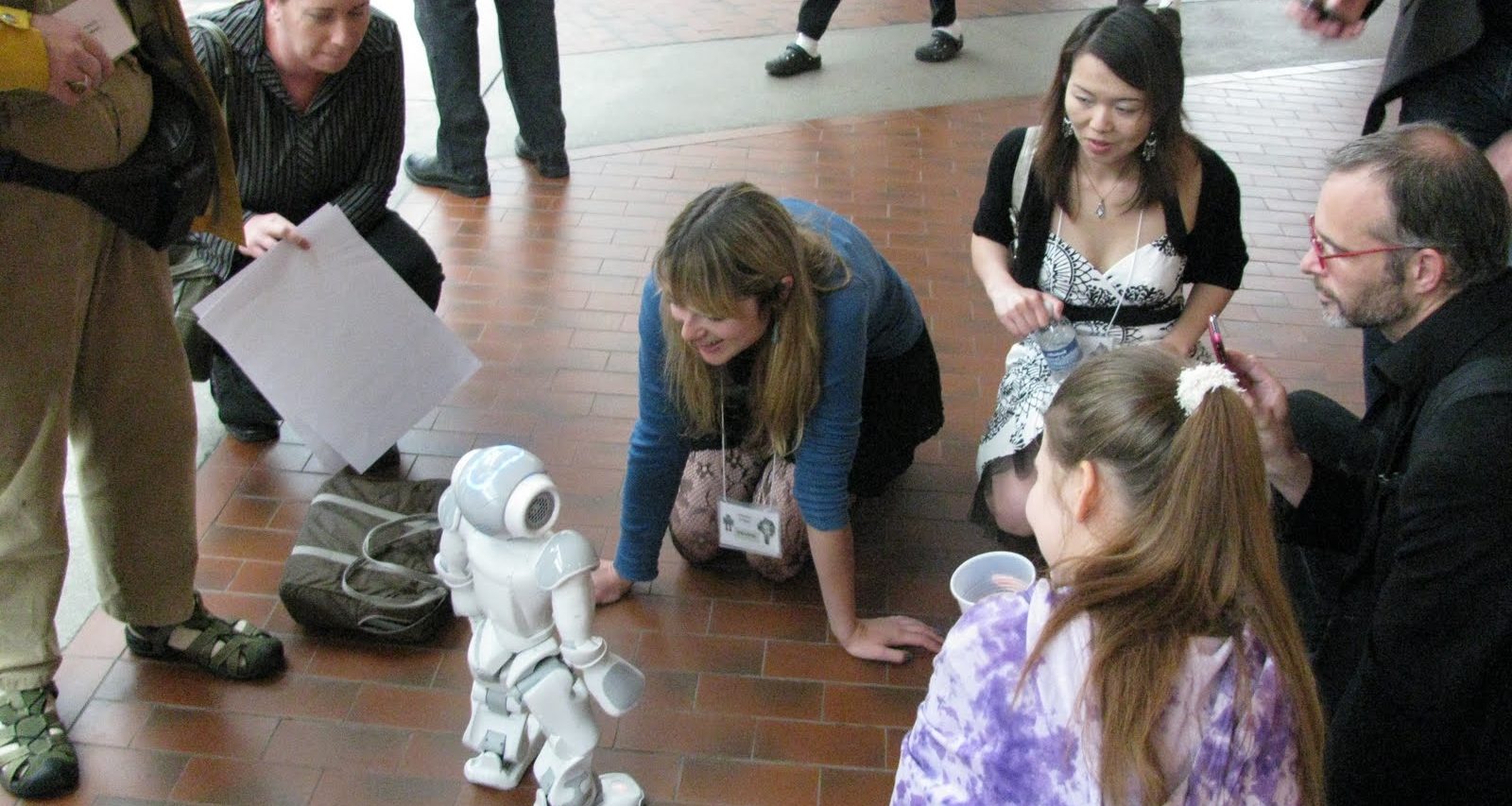 Heather Knight charms organizers and attendees.
Heather Knight charms organizers and attendees.• Much of this conference was just a hodgepodge of people presenting whatever random research or project they’re working on, and attempting to puff it up in significance. One of the worst/best examples of this is Morris Johnson, one of the first presenters on Day 2. He was plugging some project of his, but seemed to have no idea of what it was or how it worked. Tweeters described it as “unwitting comedy,” asked “What is this?,” and wondered “wtf Morris Johnson is saying to us at #hplus: is this an ISO-9001 process talk? An AmWay presentation? Hemp advocacy? Don’t get it.”
• Relatedly, Russell Whitaker, aka
@OrthoNormalRuss, had some wonderful tweets (I can’t believe I am using those words) at this conference. Just a few
here,
here,
here, and
here.
• Tweeter @mrgarlic
noted, “Ran into Ray K by sink in the mens room. Not how I imagined our first meeting.” Same thing happened to me with both Kurzweil and Aubrey de Grey, and I had the same thought. They’ve made themselves out to be so above the earthly concerns of humanity that you don’t quite expect it. Which reminds me of Milan Kundera:
When I was small and would leaf through the Old Testament retold for children and illustrated in engravings by Gustave Doré, I saw the Lord God standing on a cloud. He was an old man with eyes, nose, and a long beard, and I would say to myself that if He had a mouth, He had to eat. And if He ate, He had intestines. But that thought always gave me a fright, because even though I come from a family that was not particularly religious, I felt the idea of a divine intestine to be sacrilegious…. In the second century, the great Gnostic master Valentinus resolved the damnable dilemma by claiming that Jesus “ate and drank, but did not defecate.”
As for Kurzweil, well, I am sure I am not the first to observe this, but given the number of vitamins he takes every day, he must have the world’s most expensive urine.
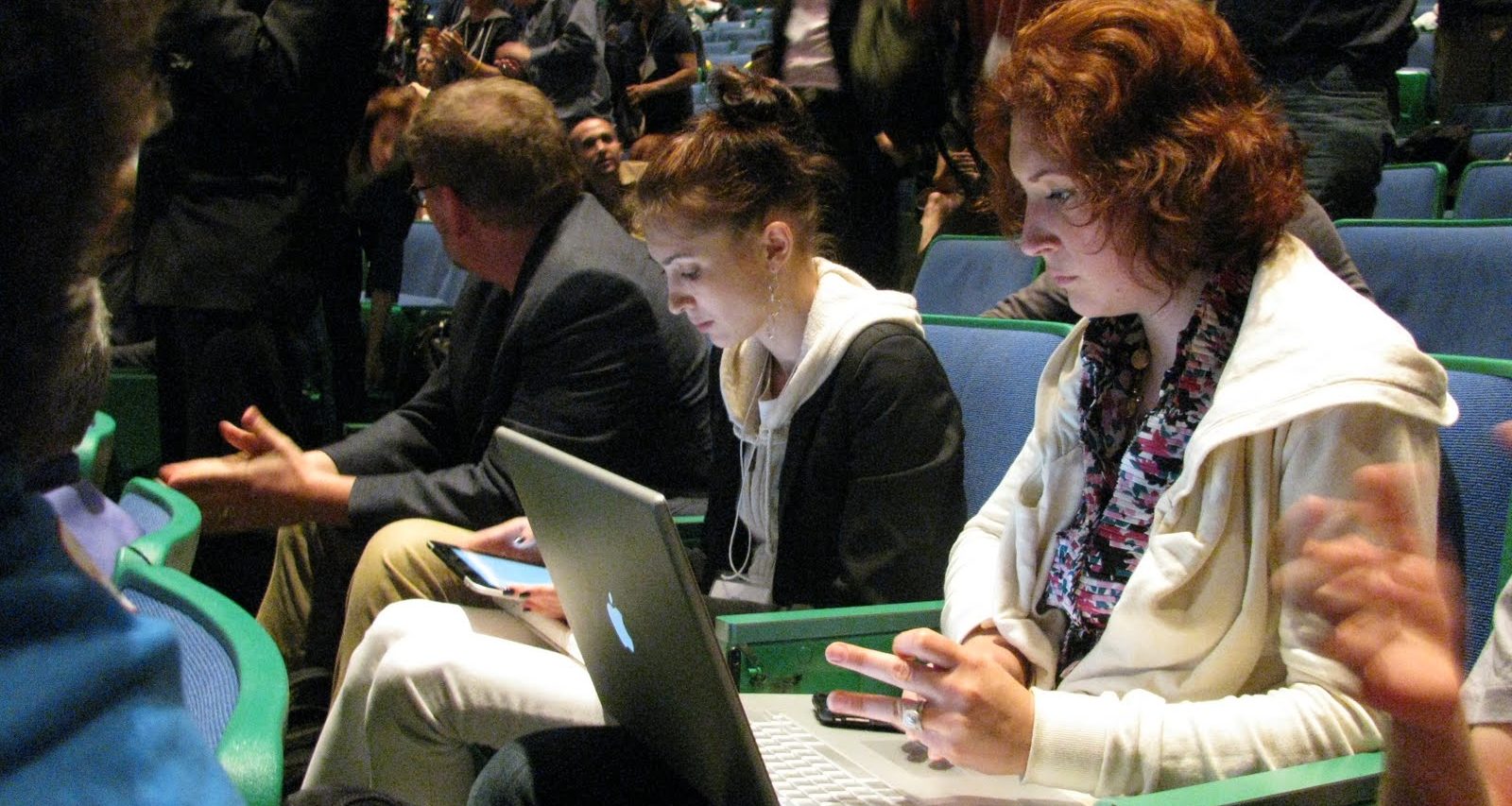 Audience members rapt at the end of Kurzweil’s talk.
Audience members rapt at the end of Kurzweil’s talk.• There have been several improbable names at this conference. We already know that Natasha Vita-More and Max More changed their names, as have others in the transhumanist camps (“
Wrye Sententia,” anyone?). But what about people like
Jessica Scorpio and
Hank Hyena?
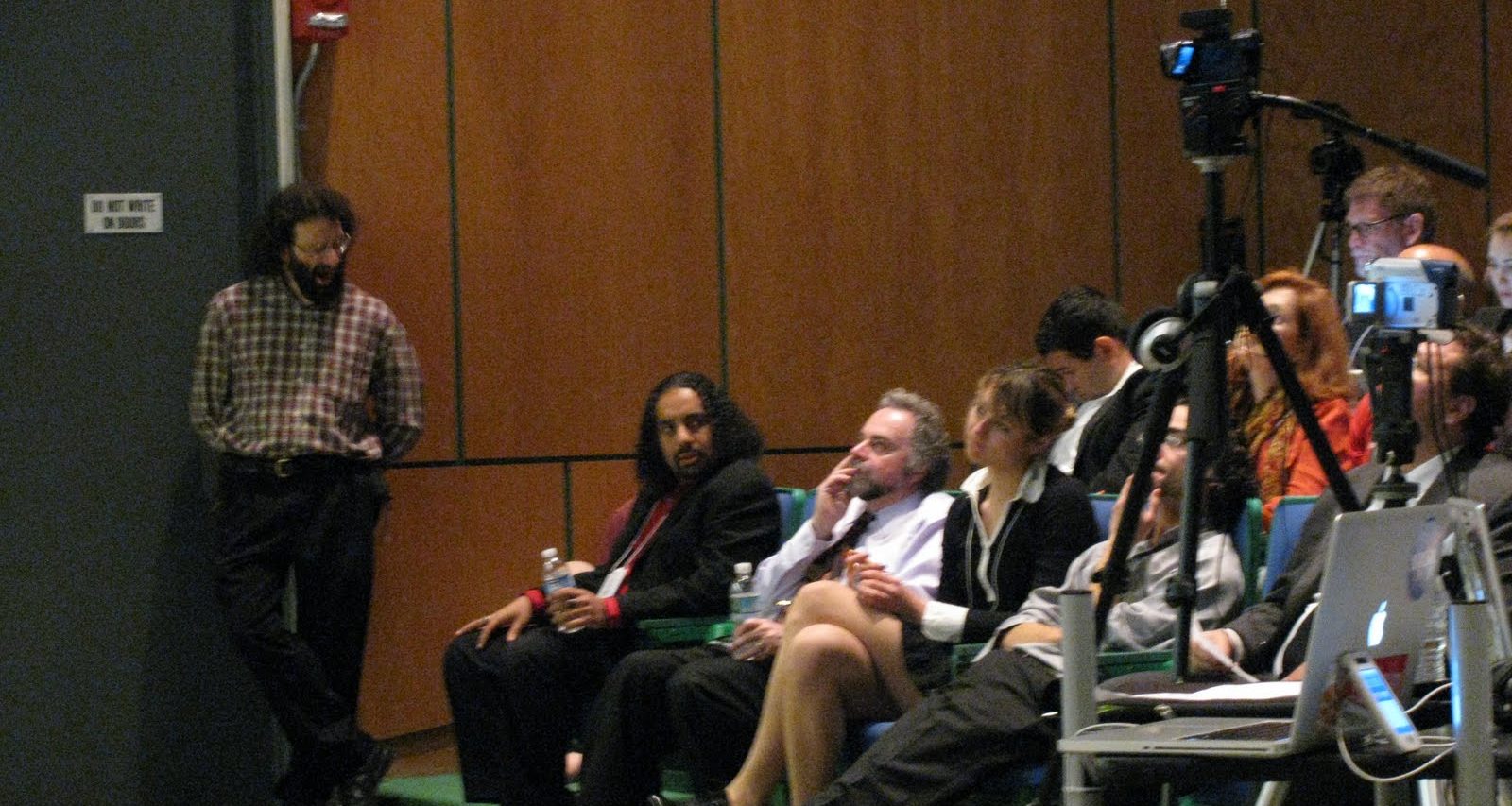
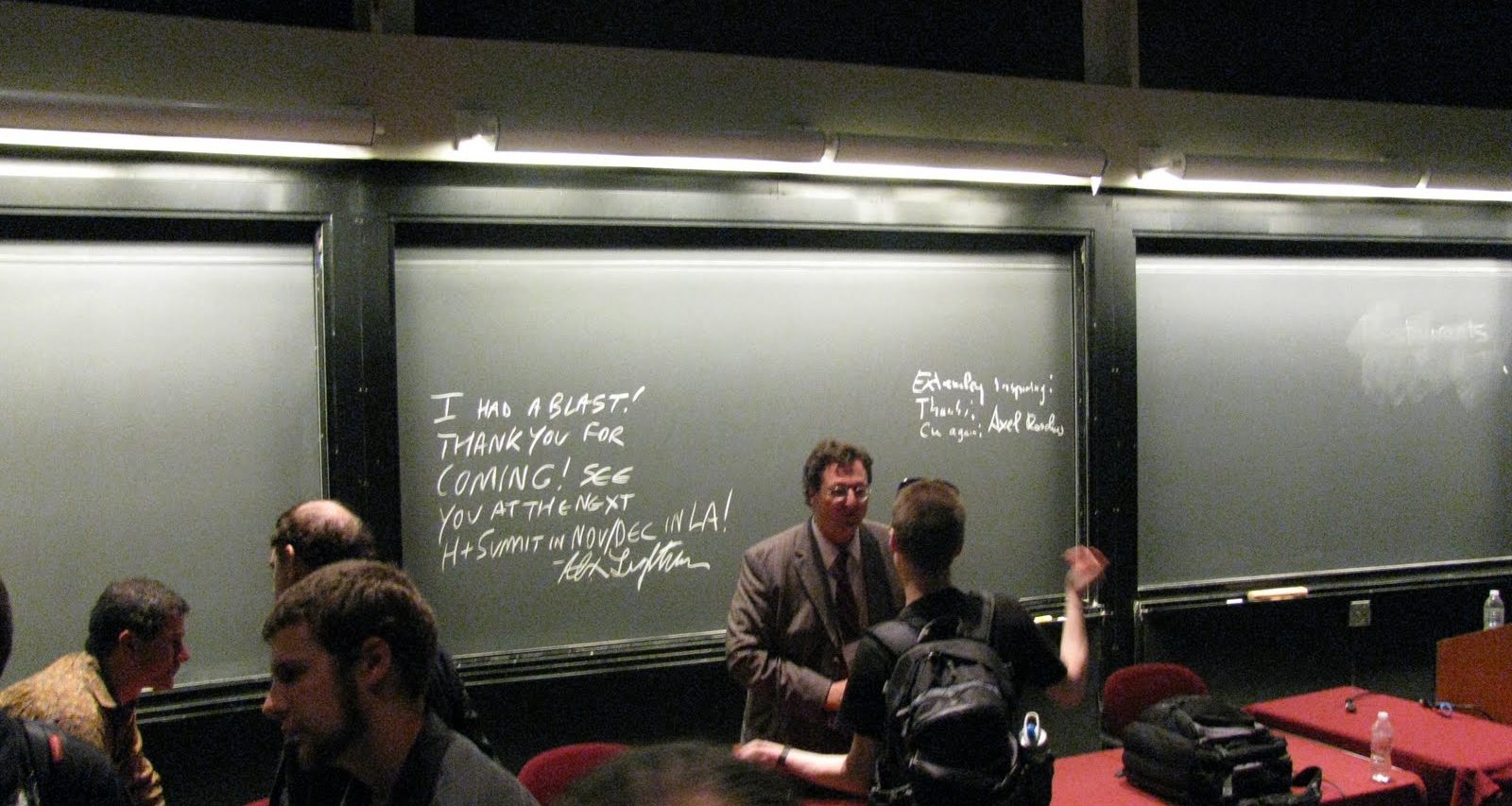 Conference farewells.
Conference farewells.
 The scene outside the conference, in Harvard meatspace.
The scene outside the conference, in Harvard meatspace.

 James Hughes and Natasha Vita-More focus on their breathing,at the request of presenter M. A. Greenstein.
James Hughes and Natasha Vita-More focus on their breathing,at the request of presenter M. A. Greenstein. A cockroach suffers indignity during Timothy Marzullo’s talk.
A cockroach suffers indignity during Timothy Marzullo’s talk.










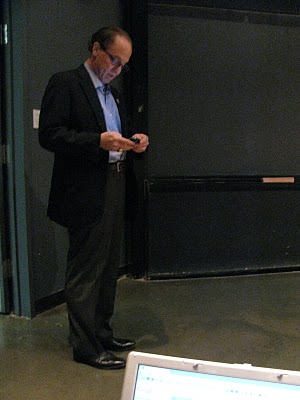
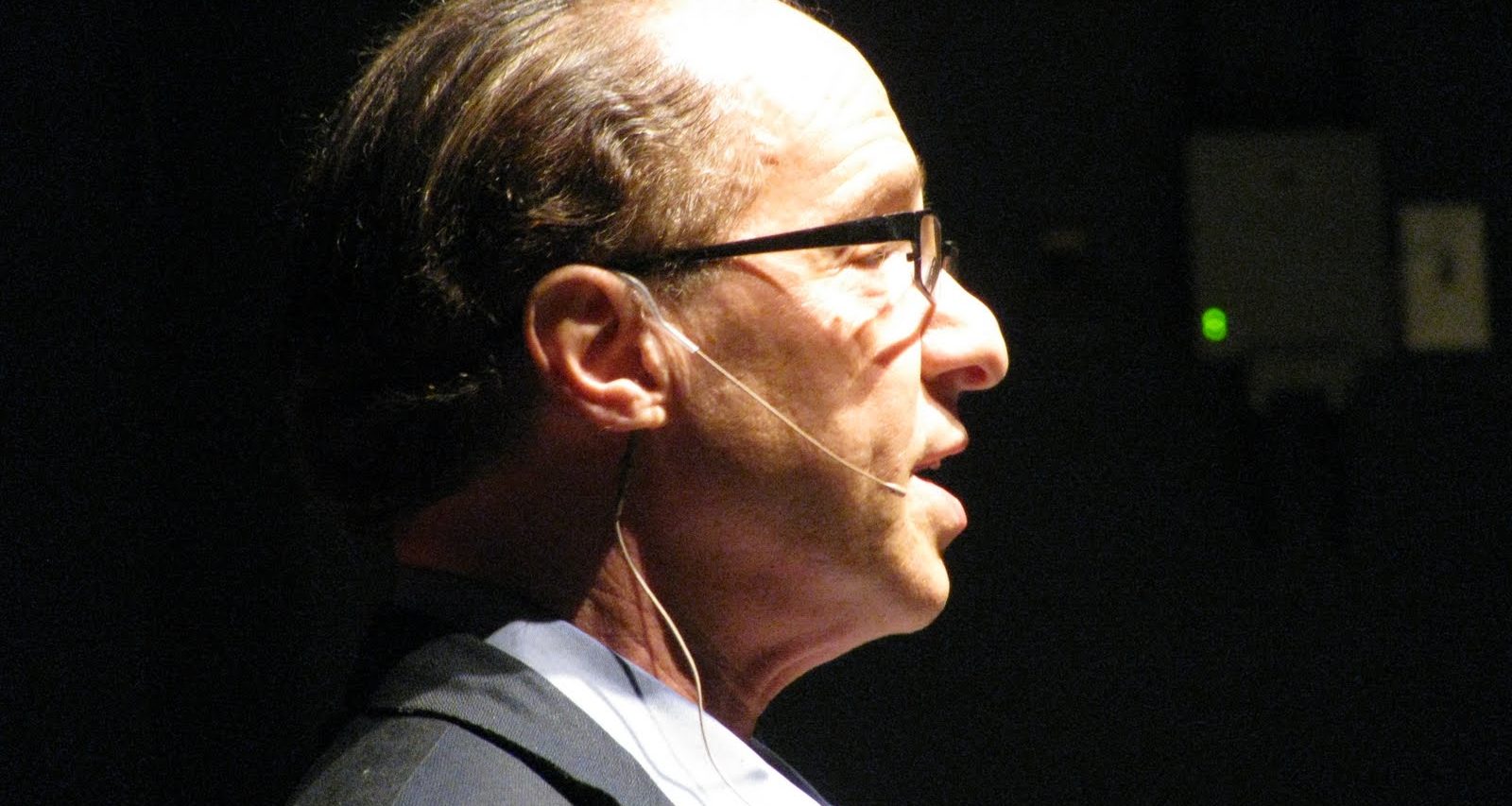
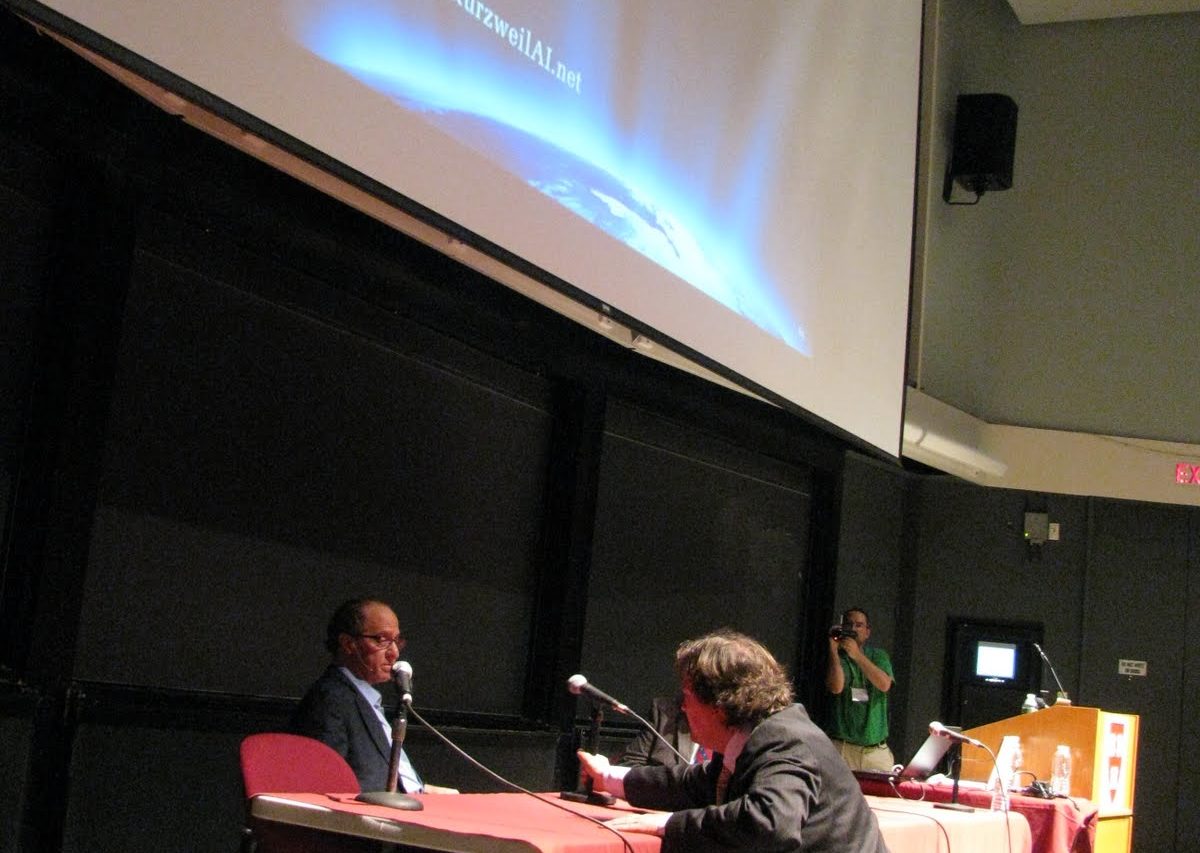




Ari –
Do you really believe that embryonic stem cells, or even whole human embryos, have (or should be accorded) "rights"?
If so, do you think opposition to the transhumanist project necessarily stands, or should, on the same foundations (other than, perhaps, ironically, in the financial sense) as opposition to abortion, or to the use of otherwise moribund embryonic cells, left over from IVF work, for the healing of otherwise sick people?
Given the balance of public opinion on these other questions, I would be very discouraged if I believed that.
Regards,
Mark
You mistakenly labeled David Orban as Alex Lightman.
Does the fact that many transhumanists are white males make the argument that speciesism is analogous to racism any less poignant? It's not like transhumanism is mostly white males because they are sexist. It's because white men tend to be the most interested in cutting-edge technology. As transhumanist technologies get less cutting edge and more everyday, more people will adopt "transhumanist" beliefs. They won't call themselves as such though — adoption of transhumanist technologies will just be considered "normal", except for a few pockets. (Which transhumanists fully support the right to exist!)
Nice coverage and photos, thanks.
Dear Mark,
You're reading too much into my comment. First of all, neither I nor anyone else I know of claims that embryonic stem cells have a moral status in and of themselves. To answer your question, I do think that there is a lot of common ground to be found between opposition to transhumanism and opposition to abortion and embryonic stem cell research. But there are myriad reasons to oppose or support either, and neither by any means requires the other. The body of work accrued on this blog and in this journal attests to at least a few of those reasons for opposing transhumanism, few if any dependent upon particular stances on those issues.
As for the other question at hand: Transhumanists like Bailey expend a lot of energy complaining about hypothetical future infringement on their rights, or the rights of hypothetical artificial or enhanced beings. My point is that they evince remarkably little curiosity about whence these rights originate. With all their talk about rights, about "all life being precious," and about expanding our moral horizons to include beings we don't now immediately think of as deserving protection, you'd think they might at least stop to contemplate difficult cases like human embryos, which are, after all, alive and on their way to being sentient.
This is particularly true in the case of Bailey's argument, because he's claiming that governmental restriction of embryonic research is a form of tyranny, just like the tyranny that used to exist in this country against vulnerable minorities. But if it is in fact the case that embryos are human beings, governmental restrictions on destroying them are actually quite the opposite, a guard against tyranny over another vulnerable minority. My qualm was that Bailey didn't even stop to discuss whether this might be the case. (Though it's possible he's written on this elsewhere, perhaps in his book Liberation Biology, and didn't have time to attend to it in this talk.)
I don't at all think it's a simple moral question; on the contrary, it's in part because it does force us to clarify our understanding of where our rights and moral status come from that it's so important. That transhumanists seem so uninterested in it despite their rhetoric suggests that their paramount interest in individual rights springs from self-interest, rather than the universal benevolence they like to claim.
(For interested readers, The New Atlantis has previously explored the questions of stem cell research and the moral status of the embryo.)
Yours,
Ari
@Michael: Thanks, I've corrected the error.
The speciesism/racism analogy would hardly be "poignant" even if it were correct, and, of course, it's not, as we've recently argued. But aside from that, yes, when transhumanists repeatedly posture as if they're the natural successors to abolitionists, suffragettes and civil rights activists, fighting for the rights of the oppressed, it does quite undercut their point to realize that they are in fact just about the most privileged and least oppressed people in the world. It's not a definitive counterargument, but it certainly raises some immediate questions about whether that claimed moral continuity is really true.